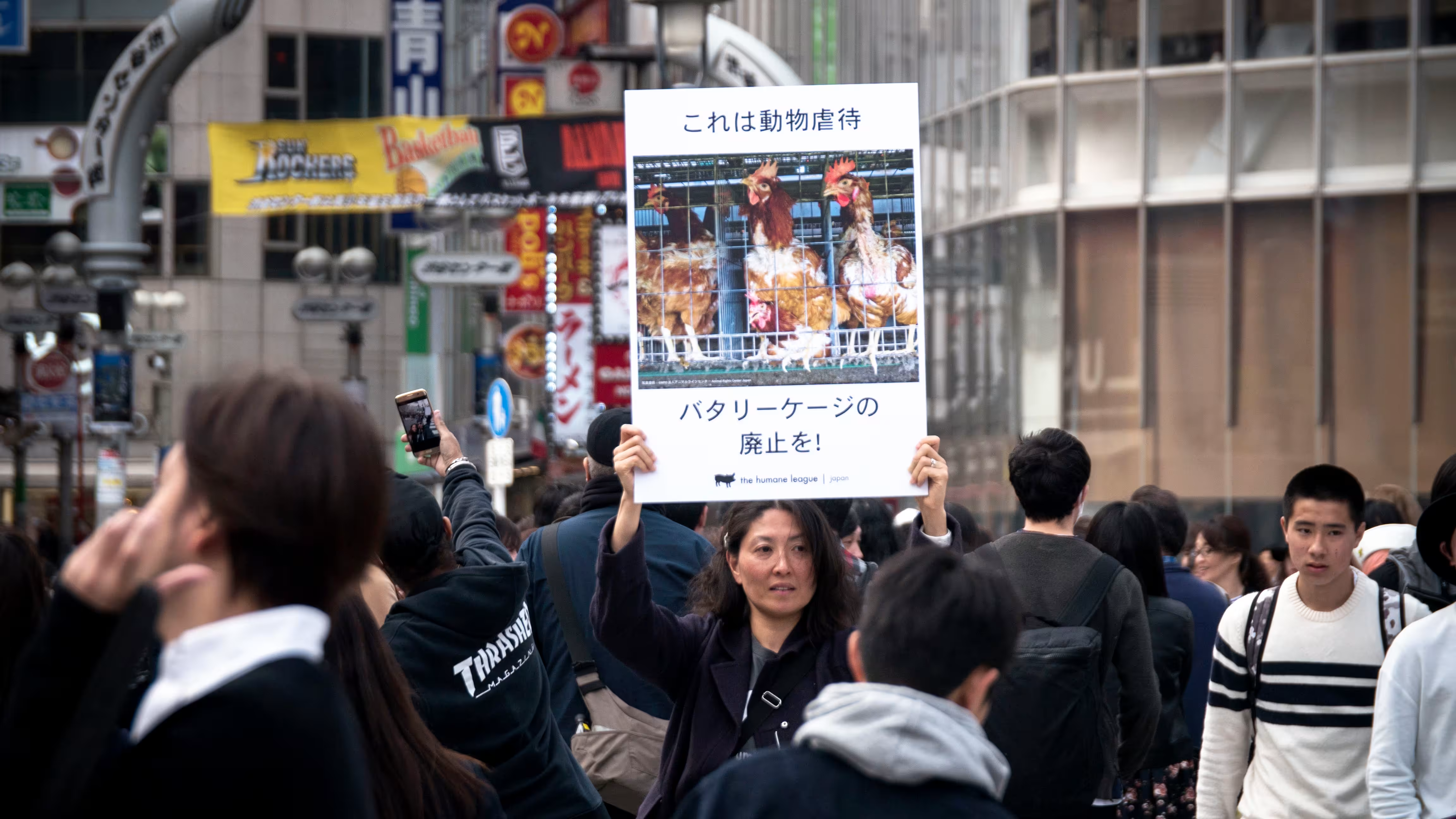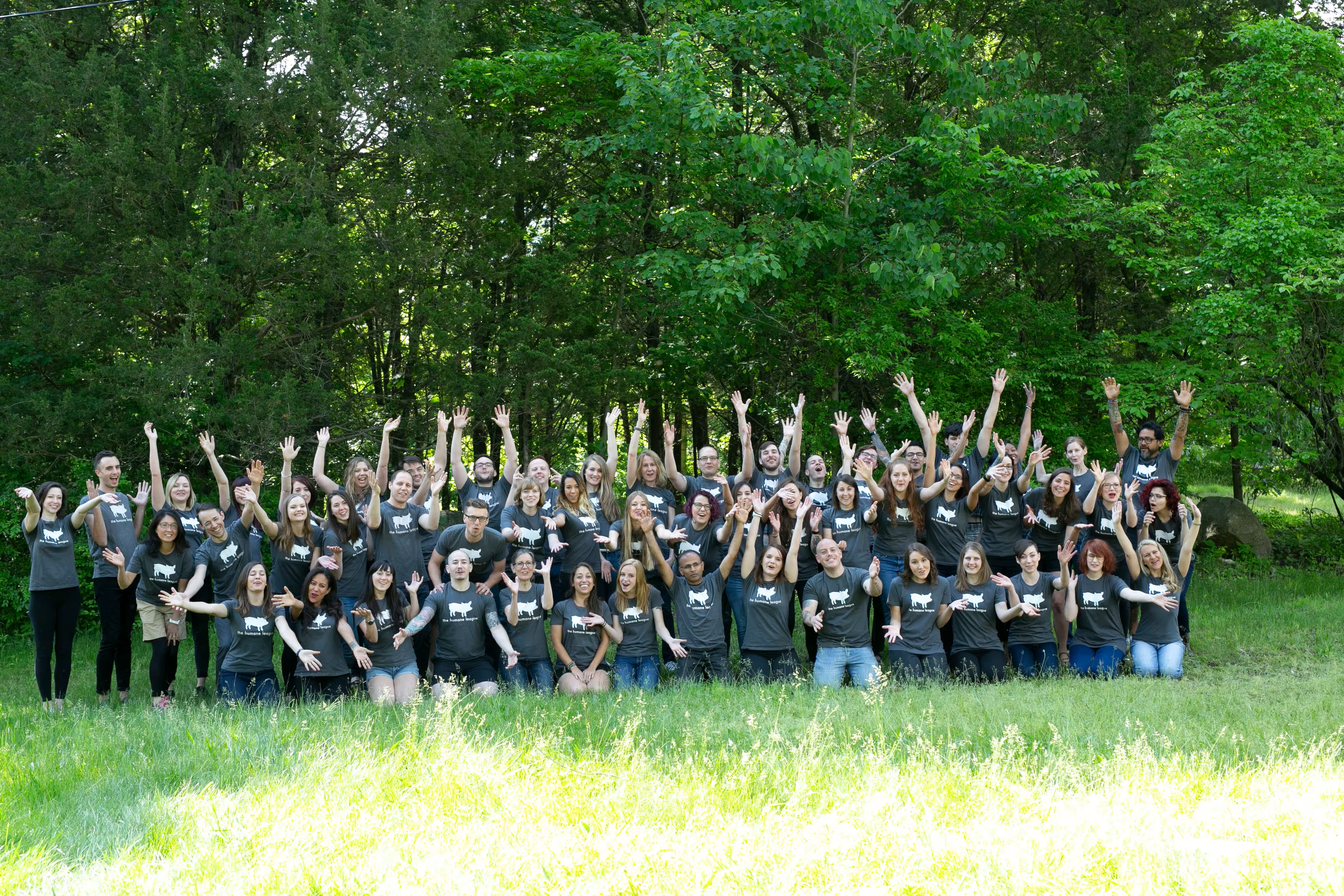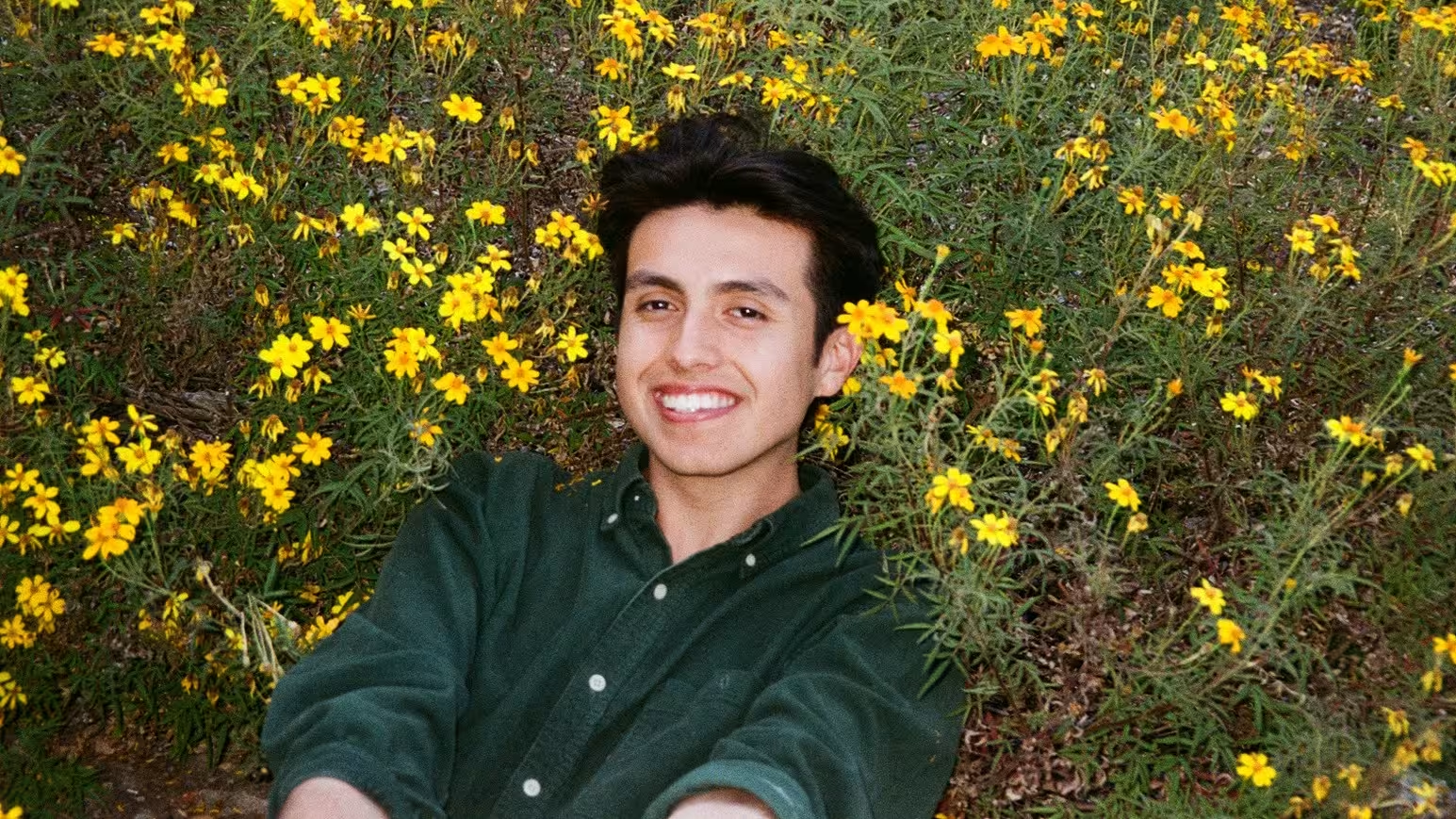




The Humane League Japan celebrates its fifth year of creating change for animals!

Since 2017, The Humane League (THL) Japan has worked relentlessly to end the abuse of animals raised for food. More than half the world’s hens live in Asia, and the majority of Asia’s largest food companies are based in Japan. As the fourth largest egg producer in the world and the eleventh most populous country, with the third largest gross domestic product (GDP) after the United States and China, strategic animal advocacy in Japan is key to loosening the vice grip of industrial agriculture everywhere. In short: making progress for egg-laying hens in Japan will move the needle on animal welfare around the world.
In early 2017, THL hired two full-time staff members to begin work in Japan. In that first year, the team put together a database of all food companies operating in Japan, forged relationships with animal welfare experts and animal welfare organizations, met with several of the largest corporations in Japan and Asia—including AEON, 7i Holdings, CO-OP, Family Mart, Isetan-Mitsukoshi, Nestle, Skylark, Hilton Hotel, and Nikkoku Trust—and worked with Compass Group to publish its global cage-free policy on its Japanese website, making it the first company to produce a cage-free policy in Japanese as a result of collaboration with THL and THL Japan.
Since then, THL Japan has made amazing progress for egg-laying hens across the country. An article by a leading Japanese poultry magazine described THL Japan as “very polite but definitely pushing corporations to change their current egg production practices.” It went on: “This organization is serious and scary." Living up to their reputation as fierce changemakers for chickens, the team worked with 6 companies to transition to cage-free eggs in 2021. And THL Japan now serves as a core member of the country’s first-ever committee to develop cage-free standards, offering recommendations to the Ministry of Environment and Ministry of Agriculture and, ultimately, influencing companies to eliminate battery cages from their supply chains. As THL Japan’s Regional Manager Maho Uehara puts it, “There is more work to be done, but this is a tremendous step forward for millions of hens in Japan.” Maho joined THL Japan in 2017, when the team was just getting started. In this conversation, she shares her experience watching THL Japan—as well as the broader cage-free movement in Japan—blossom.
How did you find your way into animal welfare activism and, eventually, to THL Japan?
Maho: Prior to joining THL Japan, I’d been involved as a volunteer in animal advocacy work in Japan for decades. Over the course of my time as an advocate, I realized that I wanted to receive disciplined, academic training to become an even better advocate for animals. So I went back to school, and I got a graduate degree in Animal Policies and Advocacy at Humane Society University. Upon graduation, I thought there wouldn’t be many opportunities for me. But then my friend told me that there was a perfect job for me: Corporate Relations Specialist at The Humane League Japan. With my background in farm animal welfare advocacy work in Japan, and because I speak both English and Japanese, it was a really amazing fit!
As you reflect on where THL Japan started and where you are now, what comes to mind?
Honestly speaking, we have faced constant uphill battles throughout our work—but the battles have been worth fighting. Now I can see proof that the cage-free movement has arrived here in Japan, and we’re experiencing great momentum. The cage-free movement is truly shaking up a very long-established industry.
One thing we have been mindful of since the beginning (to get the results we want!) is that cage-free advocacy and activism goes beyond animal welfare alone—it’s also a significant social issue. Throughout my work, I’ve made the conscious choice to discuss layer hen issues in a way that connects them to human rights issues, children's issues, and any other social issue. Our activism needs to be inclusive, involving various stakeholders, not just corporate leaders in the farmed animal industry, but also producers, manufacturers, wholesalers, funders, researchers, the general public, and so forth.
Can you tell us about a “breakthrough” moment from THL Japan’s first five years?
Thinking back, there have been several breakthrough moments.
The first breakthrough was in 2017, when Compass Group’s Japan operation published its cage-free policy in Japanese. I remember the day, being so excited to share the news with my then-supervisor, who was so excited about it too. The language of the policy itself wasn’t as powerful as western ones, but it was the first-ever cage-free policy that THL Japan had secured in Japan—and the first one we had won since I started working there—so it was very exciting! I couldn’t say how many hens will be free from cages, thanks to the policy, but the mere fact that Compass put out a policy in Japan gave a huge amount of credibility to both THL Japan and the larger cage-free movement.
That same year, in 2017, we sent out letters to major corporations in Japan, and we were able to set up about 20 meetings. In those letters, I would tell corporations, "We would like to talk with you about the global cage-free movement, its influence on Japan, and how to publish cage-free policies." These meetings weren’t about getting them to publish a policy immediately, given that the animal welfare movement in Japan was—and is still—quite young, and also given that, culturally speaking, applying public pressure to Japanese companies through hard-hitting campaigns isn’t a productive way to create change. So, instead, our main goal was to help these corporations really see that cage-free is the future—and that they need to get started soon. Engaging with corporations—learning more about the status of their egg purchases and getting a better sense of their knowledge of animal welfare (or lack thereof)—really helped me develop effective strategies to change the world for chickens. And it’s gone well—as of 2022, The Humane League Japan has secured more than 50 commitments!
Another breakthrough was when AEON TOPVALU Green Eye Natural launched cage-free eggs for its private brands. In 2020, there was a big bribery scandal between a former agricultural minister and one of the largest egg producers in Japan. The egg producers had bribed the agricultural minister to keep cage systems intact and protect companies’ vested interests. But it backfired and ended up highlighting the cruelty of cages. Thankfully, this scandal pushed the cage-free movement forward, and the movement has gotten more media attention since then. That same year, actually, several major corporations in the country published animal welfare policies, coming one step closer to publishing cage-free policies.
Our most recent breakthrough was when Mia Fernyhough, the Senior Animal Welfare Specialist at THL, worked with our team to create a THL Japan cage-free standard. This resource shows corporations the best practices for higher welfare cage-free egg production. Essentially, it functions as a reference for what the “best cage-free practices” are. We’re hoping that corporations and producers can use our standard as the reference for their operations.
What are your hopes for THL Japan as you look ahead to the future?
Because we have a very strong team now, we can start to focus more on Japanese corporations—rather than solely on global corporations that have a presence in Japan. Up until recently, in order to create momentum, we primarily engaged with global corporations’ operations in Japan, since they usually have a better understanding of cage-free issues and animal welfare.
Now that it’s been five years since we started our work in Japan, we believe that the momentum has grown quite a lot. Japanese corporations are now generally aware of the cage-free movement. So from this year on, we’ll put our energy towards educating Japanese corporations, bringing them into the movement, and encouraging them to make the cage-free switch.
More broadly, what are your hopes for the movement to end the abuse of animals raised for food?
When I became vegan over 20 years ago, it felt that veganism was such a distant idea to the general public, and I struggled just finding food that I could eat. More recently, words like “alternative meat,” “plant-based,” and even “vegan” are mentioned much more often, and there are more and more plant-based foods in the market. Around the world, younger generations are learning about social issues and ethical consumerism and so on, so we’re hopeful that global attitudes towards consuming animal products are changing—and this trend is happening in Japan, too.
In the meantime, the consumption of animal products continues, and the abusive methods of production continue, so it is so important and valuable for us to do everything we can to make incremental changes to our current system of animal agriculture. I personally think that we can’t skip the advocacy process, especially because veganism is still a young movement in Japan. As long as animals are being raised to produce food, I feel that it’s so important to work to change how they’re treated—right now.
Where do you see THL Japan—and the movement—going from here?
Over the next few years, maybe the next five years, we will focus on Japanese corporations, and put our energies towards guiding and coaching them to purchase cage-free eggs. We’ll need to share the most up-to-date information, knowledge, and skills with them, and we’ll need to show them successful examples of other companies that went cage-free. We want them to be well-equipped and confident about publishing cage-free policies.
In the next five years, we’re also hoping to establish a cage-free egg market. For that, we’re planning to start a cage-free egg producer alliance. The alliance will allow us to show corporations that Japan has the capacity to produce enough cage-free eggs. We’re also going to use the alliance as a place for a peer-to-peer education (producer-producer).
Because groupthink is strong in Japan, we feel that it’s important that corporations collaborate and make changes together. So we’re planning to provide exactly those kinds of opportunities to corporations in Japan. Once a handful leaders from each industry shifts to cage-free, there will be followers. We’re hoping to create this phenomenon. We will “help” the leaders of these industries so that they can take the initiative themselves—together.
 Ashley Chang
Ashley Chang





